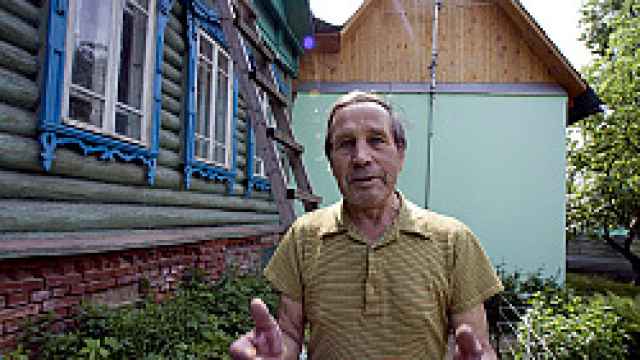The 82-year-old retiree with blinking blue eyes supplements his monthly pension of 4,000 rubles ($170) with what grows in the garden in front of his small wooden house. His nephew Mikhail, 47, brings home another 15,000 rubles ($635) a month from his job as a security guard. Together they barely scrape a living.
Nikitin may not be so average in having surpassed the country's male life expectancy of 59 by 23 years. But in his neighborhood, he stands out for his poverty. Nikitin is encircled by wealth.
This is Barvikha, a dacha community in the woods just west of Moscow and a haven for the well-to-do since Soviet times. This is where President Boris Yeltsin welcomed special guests at a government dacha, a tradition kept up by his successors, Vladimir Putin and Dmitry Medvedev.
Wander into the fir-tree forest above Nikitin's humble home and you can peek through the high fences with surveillance cameras that guard the not always tasteful architecture of the country's rich and famous.
Or watch the heavy traffic roaring past Nikitin's dusty fence and you will see more Range Rovers and Rolls-Royces than in some of London's fancier districts.
Follow the limousines to Barvikha Luxury Village, a sprawling country house-style shopping mall on the town's western rim, and admire the breathtaking offers of expensive cars, watches, jewelry and designer clothes.
On a recent Sunday, customers flocked to the Bentley showroom, where prices start at about 8 million rubles ($320,000) for a budget model. The British-built high-end limousines have recently become an ubiquitous symbol of Moscow's nouveau riche, and a saleswoman, who would not give her name because she was not authorized to speak to the media, said demand was growing every month.
But she also explained that many customers were concerned about being recognized in their cars and therefore ordered tinted windows. "For instance, there are State Duma deputies who do not want to show that they have more income [than other deputies]," she said.
Speaking to the Nikitins, you feel one of the country's most striking paradoxes -- the growing chasm between the rich and the poor.
"They do not speak to us. They do not greet us," Mikhail Nikitin said of his well-off neighbors. "Sometimes I think they should all be sent to Moscow -- in an armored train," he said, laughing.
A Growing Gap
Stunning inequality has become a part of life in today's Russia, and the gap is steadily growing between the rich and the poor.
The country's number of billionaires shot up from 60 to 110 over the course of last year, according to Forbes' rich list published in April. The magazine's Russian edition valued the combined fortunes of the top 100 at $522 billion, or more than one-third of the country's economy, up 54 percent from $338 billion in March 2007.
The number of citizens with a net worth of more than $1 million, so-called "high net-worth individuals," increased 14.4 percent to 136,000 people in 2007, according to a report released in June by Merrill Lynch and Capgemini.
Yet the country's average monthly wage stands at just 16,253 rubles ($686).
To highlight that this is average, speak to day laborers like Sergei, a builder in Moscow's Kurkino district who said he earns 500 rubles a day -- just 10,000 rubles a month.
In addition, 18.9 million Russians live below the poverty line, earning less than 4,000 rubles ($170) per month.
However, official statistics claim that inequality in Russia is lower than in the United States, albeit significantly higher than in Europe.
The country's Gini coefficient -- a scientific standard to measure income distribution from zero (perfect equality) to one (one person earns everything and all others nothing) -- has crawled up from 0.395 in 2000 to 0.412 in the first quarter of 2008, according to the State Statistics Service.
In the United States, the figure was 0.47 in 2006, while most West European countries have Gini coefficients from 0.25 to 0.35, according to the UN World Human Development Report 2007/2008.
The official Russian figures, however, are inaccurate, and the inequality is really much higher, economists and sociologists said. The numbers are flawed because of the enormous unofficial income that does not show up in official records, they said.
Companies are known to pay their employees low official salaries and add extra money on the side to avoid taxes. Civil servants, on the other hand, are known to accept "gray taxes" -- large payments from companies that expect administrative favors in return.
Such practices appear mainly to be a phenomenon for higher-income groups. Poor people, by contrast, have fewer opportunities to get extra cash unofficially.
Olga Kryshtanovskaya, a leading sociologist, said Russians are more prone to invest in and flaunt luxuries than in the West. "It is a Russian characteristic that even the poorest people have ??rystal ware and gold at home," she said. The ongoing consumer boom is also a means of compensation for past poverty, she said.
But that did not mean that those who drive around Moscow in Mercedes and Bentley limousines are showing off everything they have, Kryshtanovskaya said, noting that she knew quite a few millionaires with "ascetic" lifestyles.
Sergei Guriyev, rector of Moscow's New Economic School, agreed that there was massive underreporting of income. Realistically, he said, the nationwide Gini index could be approaching 0.5, while the index for Moscow was as high as 0.6. This would place the capital in line with some of the world's most unequal places like Bolivia, Botswana and the Central African Republic, according to the latest World Human Development Report.
Another, more telling method to describe inequality is to divide the population by income groups. By that, official statistics show, the richest 10 percent of the country's population earned 31 percent of the overall income last year, and the top 20 percent took home 47.8 percent. Moscow's massive poverty gap is all the more ironic because this was the heart of the Soviet Union, the country that for 70 years propagated the end of inequality.
Government officials have pointed to large reductions in poverty and unprecedented rises in income. Official statistics show that the share of the population living below the poverty line has plummeted from just above 20 percent in early 2006 to 13.4 percent in the course of last year.
From 2001 to 2007, the number of poor has been more than halved, from 40 million to 18.9 million.
And incomes have risen spectacularly. Inflation-adjusted real wages rose more than 11 percent from April 2007 to April 2008. In the course of two years, real incomes on average climbed 25 percent, according to official data.
 Vladimir Filonov / MT Nikolai Nikitin standing by his humble house in Barvikha, where he lives surrounded by multimillion-dollar mansions. | |
Yet while economic growth boosted by record oil prices has helped the government to achieve impressive numbers, inequality has grown.
For one, differences between the country's regions are huge. Whereas the average income in Moscow is 30,818 rubles ($1,233), in Dagestan, the country's poorest region, the average income is just 6,923 rubles ($276).
Even though most of the country's wealth is accumulated in Moscow, the capital also boasts a much higher fraction of people living under the local poverty line. According to the city's statistics service, last year 23 percent of Muscovites lived in poverty, defined as a monthly income of less than 5,758 rubles ($230).
Many experts agree that high levels of inequality pose multiple problems, threatening social cohesion and an increase in crime rates.
Middle Class and Taxes
The government, it seems, has decided to address the problem by focusing on the growth of the middle class.
President Dmitry Medvedev has said that only a fast-rising middle class "can become the buttress of democratic development." He has also said the middle class should make up 60 to 70 percent of the country's population by 2020, on par with levels in Western Europe.
Yet sociologists said that while 22 percent of the population is middle class by income, only 7 percent of the population could be classified as belonging to that group if education and self-consciousness are taken into account.
| ||||||||||||||
Many blame the tax system for galloping inequality.
"I don't know one other country in the world where the tax system stipulates that the poor share with the rich, rather than the rich sharing [their wealth] with the poor," said Oleg Smolin, a Communist State Duma deputy.
Smolin identified the country's flat income tax, introduced in 2001 at 13 percent, as the main culprit.
He said that since opportunities for tax evasion were more widespread among higher income groups, the system was turning absurd. "We have gone even further [than the flat tax] to a regressive system -- the more an employee earns, the less he gives back to society," he said.
To bridge the income gap, he said, the government needs to introduce a progressive tax system.
Kryshtanovskaya, who heads the Russian Academy of Science's center of elite studies, also backed the introduction of progressive taxes and said financial controls should be increased. "[The government] should be able to control payments like in most other economies around the world, where the majority abides by the law," she said.
While Guriyev agreed that inequality was too high, he strongly warned against changing the flat income tax regime, arguing that it was important for pulling the economy out of the shadows.
Rather, he said, it is necessary to tackle inequality because as long as it is high, "it is very hard to resist temptation to tax the rich, which in turn undermines economic growth."
The most promising path, he said, would be to promote equal opportunities through the reform of health care, education and housing.
Guriyev said it was a good sign that the Kremlin's national projects addressed exactly these issues. "This shows that the government understands pretty well what needs to be done," he said.
The national projects, overseen by Medvedev when he was first deputy prime minister, target health care, education, housing and agriculture. Spending reached 256.5 billion rubles ($10.8 billion) last year.
A second state initiative, special economic zones, is intended to diversify regional development by creating greater economic activity outside of Moscow and the oil-rich regions.
In addition, the government is hoping to tap its sovereign wealth fund to address the problem of inequality between generations.
As with so many things in the country, the challenge lies in the implementation. "It will be very difficult to get qualified bureaucrats for the projects," Guriyev said.
He warned against attempts at large-scale redistribution of wealth because this would jeopardize private property. "Any attempt at expropriation would scare away badly needed foreign and domestic investors," he said. As examples he listed Latin American countries like Bolivia and Venezuela, where nationalization had been suppressing economic activity as well as driving foreign money away.
He said the Yukos affair, where the state had forced the country's biggest private oil firm into bankruptcy, had similar effects, since the oil industry has seen both investment and output declining.
Smolin, however, lambasted a law introduced in 2005 that abolished taxes on inheritances and gifts received from family members and relatives.
What was meant as a gift to all our citizens who pass on apartments to their children actually "turned out to be a grandiose present for the so-called oligarchs, who handed down colossal real estate wealth to their children and close relatives," he said.
The Communist deputy also said salaries needed to be significantly raised in sectors where they are lowest, including agriculture and education.
He criticized the fact that a professor can earn roughly the same salary as a congressman in the United States but that the difference in income between the two is huge in Russia.
"Wages in education, science and arts are laughable. Teachers in some regions earn just 150 euros [$232] per month, while a Duma deputy like me is making 200,000 rubles [$8,500] a month," he said.
Communist deputies, Smolin said, are giving almost half of that back to their party.
"The government steadily refuses to raise salaries for the intelligentsia and public servants, saying this would propel inflation. But at the same time, it is pumping gigantic sums into its state corporations, which in the opinion of many, including liberals and experts, pose the much bigger factor for inflation than public sector salaries," he said.
Power of Inflation
Inflation is actually itself a contributing factor to inequality, because it tends to hit the poor more than the rich.
A study released last month by audit firm FBK found that an inflation rate of 14 percent this year would translate into 25 percent in real terms for the poor.
This is because poorer people spend a higher fraction of their income on staple goods, and food prices rose much more than the average, the study found.
Also, wealthier people have easier access to sophisticated financial instruments that avoid inflation, while the portfolios of the poor tend to have a larger share of cash.
Smolin warned that the current status quo posed a grave threat to political stability.
"The relative stability we have is based on the golden rain of oil revenues. It might be easily destroyed," he said.
People may not be taking to the streets now, but at the beginning of 2005, some 500,000 to 2 million people protested the monetization of state benefits, Smolin warned.
Kryshtanovskaya said the main reason for the current stability is that even the poor are seeing a chance of being better off soon -- a major difference from the 1990s. "Back then, one segment got richer, while the rest got poorer. Today, everybody is getting richer, and everybody is busy earning and spending money," she said.
Kryshtanovskaya said there probably was no point in the country's history where more wealth was being generated. During the last large-scale economic expansion in the 1960s and early 1970s, much was eaten up by the military-industrial complex. "Today, a lot goes into welfare, and that is probably unique," she said.
Editor's note: This is the 10th in a series of reports about the key challenges facing Russia today. Previous reports can be found at www.themoscowtimes.com.
A Message from The Moscow Times:
Dear readers,
We are facing unprecedented challenges. Russia's Prosecutor General's Office has designated The Moscow Times as an "undesirable" organization, criminalizing our work and putting our staff at risk of prosecution. This follows our earlier unjust labeling as a "foreign agent."
These actions are direct attempts to silence independent journalism in Russia. The authorities claim our work "discredits the decisions of the Russian leadership." We see things differently: we strive to provide accurate, unbiased reporting on Russia.
We, the journalists of The Moscow Times, refuse to be silenced. But to continue our work, we need your help.
Your support, no matter how small, makes a world of difference. If you can, please support us monthly starting from just $2. It's quick to set up, and every contribution makes a significant impact.
By supporting The Moscow Times, you're defending open, independent journalism in the face of repression. Thank you for standing with us.
Remind me later.



 Launched the national projects in 2005 to expand the underdeveloped middle class by improving basic living standards through the investment of billions of dollars in housing, health care, education and agriculture.
Launched the national projects in 2005 to expand the underdeveloped middle class by improving basic living standards through the investment of billions of dollars in housing, health care, education and agriculture.